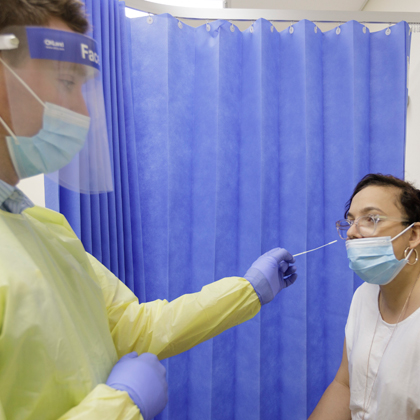A COVID-19 test is a way to check if you have COVID-19.

It is good to know if you have COVID-19 so you can look after yourself and the people around you.
On this page
-
When to get tested
-
How to get tested
-
Rapid antigen test
-
PCR test
- Resources
Some people with disability are at higher risk of severe illness from COVID-19.
Higher risk of severe illness means COVID-19 could make you very sick.
Your GP can tell you if you are at higher risk of severe illness.
When to get tested
Anyone who has
symptoms should get tested for COVID-19.
A symptom is a sign that you might be sick.
Symptoms of COVID-19 include:
- fever
- sore throat
- cough
- runny nose
- feeling short of breath
- loss of your sense of taste
- loss of your sense of smell.
How to get tested
There are two kinds of COVID-19 tests:
- Rapid antigen test (RAT)
- PCR (nose and throat swab).
Rapid antigen test
Most people can check if they have COVID-19 by doing a rapid antigen test (RAT).
You can do a rapid antigen test (RAT) at home.
You can buy a rapid antigen test (RAT) at:
- a pharmacy
- a supermarket.
PCR test (nose and throat swab)
Your GP might get you to do a PCR test if you have COVID-19 symptoms and you are at higher risk.
This is because PCR tests work better than RAT.
If you cannot leave your home because you have a disability and need a PCR test, you can call the Disability Gateway helpline on 1800 643 787 or visit disabilitygateway.gov.au.
Resources
